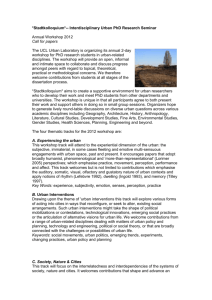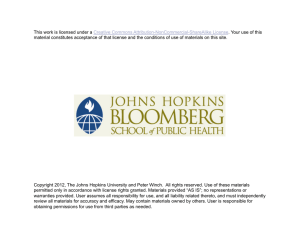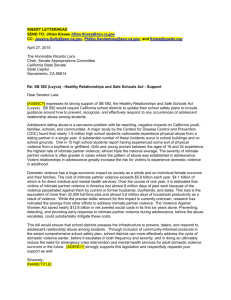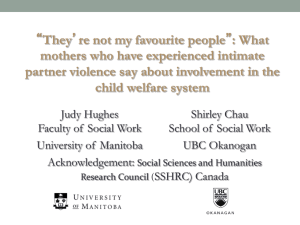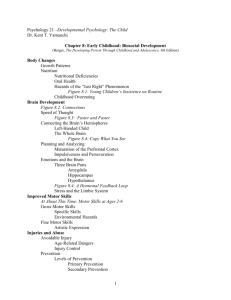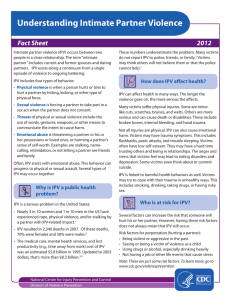Early Career Scholar application
advertisement
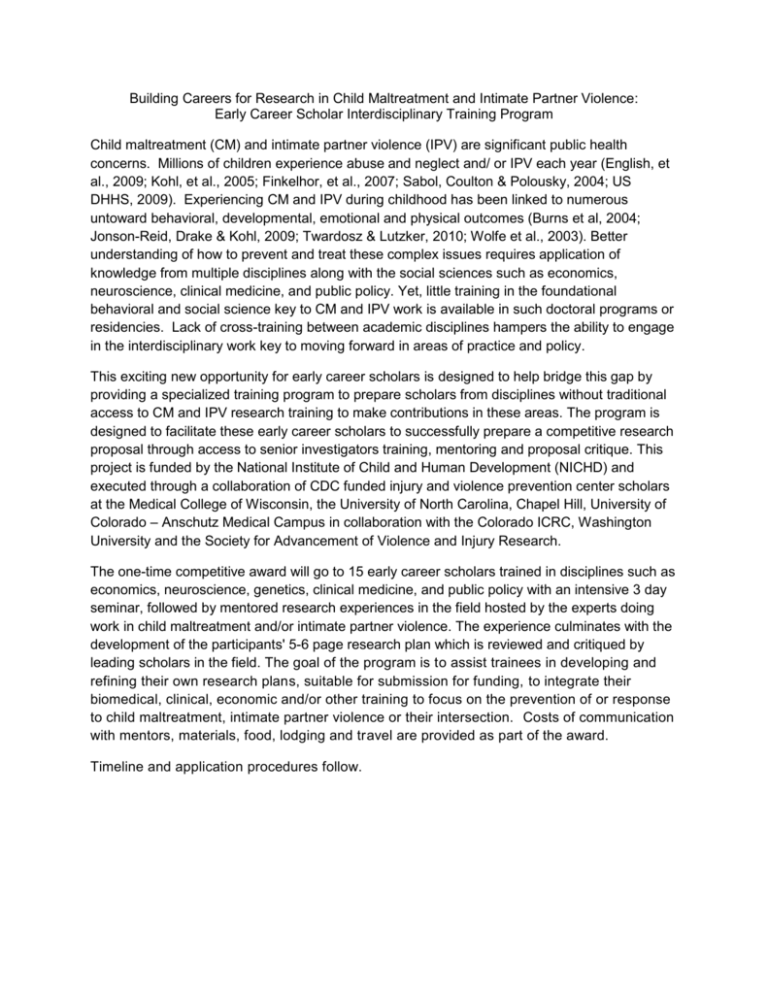
Building Careers for Research in Child Maltreatment and Intimate Partner Violence: Early Career Scholar Interdisciplinary Training Program Child maltreatment (CM) and intimate partner violence (IPV) are significant public health concerns. Millions of children experience abuse and neglect and/ or IPV each year (English, et al., 2009; Kohl, et al., 2005; Finkelhor, et al., 2007; Sabol, Coulton & Polousky, 2004; US DHHS, 2009). Experiencing CM and IPV during childhood has been linked to numerous untoward behavioral, developmental, emotional and physical outcomes (Burns et al, 2004; Jonson-Reid, Drake & Kohl, 2009; Twardosz & Lutzker, 2010; Wolfe et al., 2003). Better understanding of how to prevent and treat these complex issues requires application of knowledge from multiple disciplines along with the social sciences such as economics, neuroscience, clinical medicine, and public policy. Yet, little training in the foundational behavioral and social science key to CM and IPV work is available in such doctoral programs or residencies. Lack of cross-training between academic disciplines hampers the ability to engage in the interdisciplinary work key to moving forward in areas of practice and policy. This exciting new opportunity for early career scholars is designed to help bridge this gap by providing a specialized training program to prepare scholars from disciplines without traditional access to CM and IPV research training to make contributions in these areas. The program is designed to facilitate these early career scholars to successfully prepare a competitive research proposal through access to senior investigators training, mentoring and proposal critique. This project is funded by the National Institute of Child and Human Development (NICHD) and executed through a collaboration of CDC funded injury and violence prevention center scholars at the Medical College of Wisconsin, the University of North Carolina, Chapel Hill, University of Colorado – Anschutz Medical Campus in collaboration with the Colorado ICRC, Washington University and the Society for Advancement of Violence and Injury Research. The one-time competitive award will go to 15 early career scholars trained in disciplines such as economics, neuroscience, genetics, clinical medicine, and public policy with an intensive 3 day seminar, followed by mentored research experiences in the field hosted by the experts doing work in child maltreatment and/or intimate partner violence. The experience culminates with the development of the participants' 5-6 page research plan which is reviewed and critiqued by leading scholars in the field. The goal of the program is to assist trainees in developing and refining their own research plans, suitable for submission for funding, to integrate their biomedical, clinical, economic and/or other training to focus on the prevention of or response to child maltreatment, intimate partner violence or their intersection. Costs of communication with mentors, materials, food, lodging and travel are provided as part of the award. Timeline and application procedures follow. Timeline: October- December 15, 2011: Recruitment of applicants December 15, 2011: Final due date for applications January 2012: Awardees will be notified and pre-seminar readings will be distributed. March 12-14, 2012: Three-day seminar to be held at Washington University April-June, 2012: 2-3 day mentored on-site research experiences matching trainee interests to projects across the country will occur according to the schedules of the mentors and trainees. August 1, 2012: Six page research plans are due to the leadership review committee September 6, 2012: Written comments will be provided to the trainees along with certificates of completion. Commitment: Trainees must be able to attend both the onsite training and the mentored field experience, complete the readings prior to the seminar and adhere to the timeline for research plans. Eligibility: Applicants must have completed their PhD or MD (or equivalent degree) within no more than two years. Applicants must meet early career scientist criteria meaning that the scholars must not yet have been a PI on any grant beyond the R03 or R21 (developmental) levels. All participants will be required to have some training related to children’s and/or women’s health or development to serve as a foundation for participation. However, prior training specific to child maltreatment or intimate partner violence is not needed. Participants must demonstrate an interest in pursuing work relevant to prevention or intervention in areas of child maltreatment and/or intimate partner violence. Participants must also demonstrate the need for this training in order to advance their career For this project we will accept up to 15 participants with a minimum of at least four different specialties or disciplines represented. Applicants from under-represented ethnic/racial groups, persons with disabilities, or persons from disadvantaged backgrounds are especially encouraged to apply. Application Process: Applicants must submit a 2-page statement of interest describing how this program is expected to enhance the candidate’s research career development, a curriculum vitae, and three letters of support. One of these letters should be from their current institution or research center indicating that the organization is supportive of the applicant’s participation in the required training elements. Applications should be submitted to: Melissa Jonson-Reid, PhD Professor and Director Brown Center for Violence and Injury Campus Box 1196, 1 Brookings Drive St Louis, Mo 63130 Or electronically by e-mail to: jonsonrd@wustl.edu Due Date: Applications should be submitted no later than December 15, 2011 Review Process: Applicants will be reviewed by an expert panel including the project leadership team: principal Investigators, Carol Runyan, PhD and Melissa Jonson-Reid, PhD, Co-investigator Dr. Stephen Hargarten, MD, the NICHD project officer, and at least one additional reviewers drawn from each of the participating universities: Medical College of Wisconsin, University of North Carolina, University of Colorado-Anschutz Medical Campus and Washington University. Applications will be rated according to relevance of interest, likelihood to benefit from the training content (in other words, coming from disciplines/training programs not already benefiting from such material), promise as an independent researcher, and strength of support letters. We will select up to 15 participants, with an aim of achieving broad diversity in discipline, topical interest and ethnic and experiential backgrounds. Notices of award will be made in early January of 2012. Questions can be directed to: Carol Runyan, PhD (carol.runyan@ucdenver.edu) Melissa Jonson-Reid, PhD (jonsonrd@wustl.edu) Stephen Hargarten, MD, MPH (Hargart@mcw.edu)


